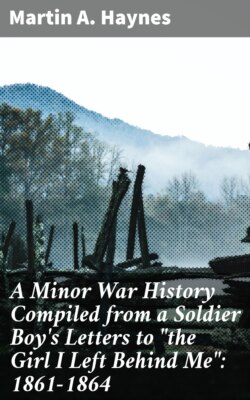Читать книгу A Minor War History Compiled from a Soldier Boy's Letters to "the Girl I Left Behind Me": 1861-1864 - Martin A. Haynes - Страница 19
На сайте Литреса книга снята с продажи.
XVI
ОглавлениеTable of Contents
Washington, D. C., July 24, 1861.
IINTENDED to write to you yesterday, but after what I have been through in the past week I simply couldn’t get up steam. Last Tuesday—a week ago yesterday—this regiment crossed the Potomac at Long Bridge, with the other regiments and batteries of Burnsides’ brigade, and advanced into Virginia. Saturday night we were encamped about a mile from Centreville. At two o’clock Sunday morning we were up and on the march, and at ten o’clock we came upon the secessionists at Bull Run and engaged them. The battle lasted several hours, when we were obliged to withdraw. It was a very disorderly retreat. We expected to be followed sharply, of course, and there was no halt worth talking about until we straggled into Washington, every man for himself. Coming and going we got in about sixty miles of travel, to say nothing of several hours on the battlefield. I was about all in when, midday Monday, I reached the Virginia end of Long Bridge. We were then inside the fortifications, and there were kettles of hot coffee and boxes of hard bread set out for everybody to help themselves. It did seem as if I never could drag myself over to our camp. But I finally negotiated with a huckster who was over there with his team, and having purchased his remaining stock of pies and distributed them among the crowd of refugees, he gave me a ride across the bridge and up into the city well toward Camp Sullivan.
The battle was the hardest fought so far, and the losses on both sides were heavy. At the roll call this morning 175 were missing from the Second Regiment, but this number will doubtless be cut down as stragglers come in. Of my eight tentmates, six went. Two [Harvey Holt and Henry Morse] were killed outright, and one [George F. Lawrence] was severely wounded in the head. I got my little upset at the very tail-end of the fight. The regiment had crossed over to the opposite hill, and about a hundred of us had taken cover in a cut in the road. We had a house on our front, some secessionist cannon up near it, and enough of the enemy to give us a real lively time. There was a rail fence along the edge of the cut, and I rested my musket on one of the rails, and carefully sighted on a fellow who seemed to be showing off. Then something happened. A cannon ball struck the rail, one of the fragments hit me in the head and neck, and I rolled down the bank. I heard one of the boys cry out “Mart is killed!” and for about half a minute I didn’t know but what I was. But when we had to break for the rear, a few minutes later, I had no trouble in keeping up with the procession.
In all my life I never suffered from thirst as I did that day. On the advance, our regiment was right at the ford of Bull Run creek when the head of the column sighted the enemy. A staff officer rode back with the announcement and called to the men to fill their canteens. I waded up a few feet and filled my canteen with good clear river water. A little while after, I took a drink, spat out the tepid mouthful in disgust, and emptied the canteen. I learned my lesson and will never do that again. Before that day was over I would have given dollars for one square drink of that same water. On the retreat I one time scooped up a few sips from a mud puddle through which men and horses and wheels were ploughing their way. Before reaching Centreville I filled up clear to the ears from a little trickling rivulet, and filled my canteen as well. Laid down in the old bivouac, and went to sleep. After two or three hours was waked up and told to keep agoing. The old thirst was on me, but when I lifted my canteen it was empty—drained to the last drop. If I could have got hold of that sneak thief the casualty list would have been one bigger, I think.
You will be pleased to know that “Heenan” behaved finely. His tin dipper, hanging by his side, was desperately wounded—otherwise all right. Frank Wasley had one or more fingers hurt by a bullet. Col. Marston was not more than twenty or thirty feet from me when he was shot in the shoulder. It was rather a wild scene just then—a dead man stretched out here and there; a stream of wounded men staggering or being helped to the rear; the Rhode Island battery, shrouded in smoke and with several horses down, soaking it to the batteries across the valley, on the other hill. A little later we were farther down the slope, lined up in a cornfield, helping drive the enemy out of woods and bushes where they were strongly posted. While here we saw the Black Horse, a famous secessionist cavalry corps, charge the Fire Zouaves, and then go back with lots of empty saddles.
I find I must hurry to get this into the mail, but will write again in a day or two.
